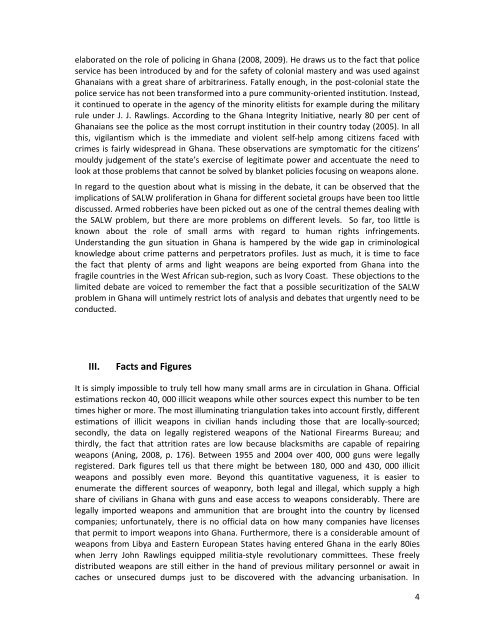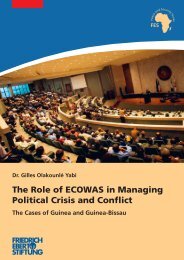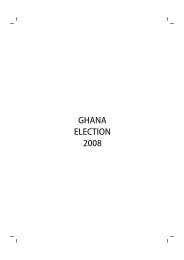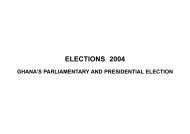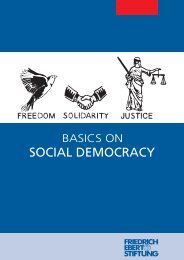'Etuo Mu Ye Sum: The Barrel of a Gun is Dark' - Clouded in Darkness
'Etuo Mu Ye Sum: The Barrel of a Gun is Dark' - Clouded in Darkness
'Etuo Mu Ye Sum: The Barrel of a Gun is Dark' - Clouded in Darkness
- No tags were found...
Create successful ePaper yourself
Turn your PDF publications into a flip-book with our unique Google optimized e-Paper software.
elaborated on the role <strong>of</strong> polic<strong>in</strong>g <strong>in</strong> Ghana (2008, 2009). He draws us to the fact that policeservice has been <strong>in</strong>troduced by and for the safety <strong>of</strong> colonial mastery and was used aga<strong>in</strong>stGhanaians with a great share <strong>of</strong> arbitrar<strong>in</strong>ess. Fatally enough, <strong>in</strong> the post-colonial state thepolice service has not been transformed <strong>in</strong>to a pure community-oriented <strong>in</strong>stitution. Instead,it cont<strong>in</strong>ued to operate <strong>in</strong> the agency <strong>of</strong> the m<strong>in</strong>ority elit<strong>is</strong>ts for example dur<strong>in</strong>g the militaryrule under J. J. Rawl<strong>in</strong>gs. Accord<strong>in</strong>g to the Ghana Integrity Initiative, nearly 80 per cent <strong>of</strong>Ghanaians see the police as the most corrupt <strong>in</strong>stitution <strong>in</strong> their country today (2005). In allth<strong>is</strong>, vigilant<strong>is</strong>m which <strong>is</strong> the immediate and violent self-help among citizens faced withcrimes <strong>is</strong> fairly widespread <strong>in</strong> Ghana. <strong>The</strong>se observations are symptomatic for the citizens’mouldy judgement <strong>of</strong> the state’s exerc<strong>is</strong>e <strong>of</strong> legitimate power and accentuate the need tolook at those problems that cannot be solved by blanket policies focus<strong>in</strong>g on weapons alone.In regard to the question about what <strong>is</strong> m<strong>is</strong>s<strong>in</strong>g <strong>in</strong> the debate, it can be observed that theimplications <strong>of</strong> SALW proliferation <strong>in</strong> Ghana for different societal groups have been too littled<strong>is</strong>cussed. Armed robberies have been picked out as one <strong>of</strong> the central themes deal<strong>in</strong>g withthe SALW problem, but there are more problems on different levels. So far, too little <strong>is</strong>known about the role <strong>of</strong> small arms with regard to human rights <strong>in</strong>fr<strong>in</strong>gements.Understand<strong>in</strong>g the gun situation <strong>in</strong> Ghana <strong>is</strong> hampered by the wide gap <strong>in</strong> crim<strong>in</strong>ologicalknowledge about crime patterns and perpetrators pr<strong>of</strong>iles. Just as much, it <strong>is</strong> time to facethe fact that plenty <strong>of</strong> arms and light weapons are be<strong>in</strong>g exported from Ghana <strong>in</strong>to thefragile countries <strong>in</strong> the West African sub-region, such as Ivory Coast. <strong>The</strong>se objections to thelimited debate are voiced to remember the fact that a possible securitization <strong>of</strong> the SALWproblem <strong>in</strong> Ghana will untimely restrict lots <strong>of</strong> analys<strong>is</strong> and debates that urgently need to beconducted.III.Facts and FiguresIt <strong>is</strong> simply impossible to truly tell how many small arms are <strong>in</strong> circulation <strong>in</strong> Ghana. Officialestimations reckon 40, 000 illicit weapons while other sources expect th<strong>is</strong> number to be tentimes higher or more. <strong>The</strong> most illum<strong>in</strong>at<strong>in</strong>g triangulation takes <strong>in</strong>to account firstly, differentestimations <strong>of</strong> illicit weapons <strong>in</strong> civilian hands <strong>in</strong>clud<strong>in</strong>g those that are locally-sourced;secondly, the data on legally reg<strong>is</strong>tered weapons <strong>of</strong> the National Firearms Bureau; andthirdly, the fact that attrition rates are low because blacksmiths are capable <strong>of</strong> repair<strong>in</strong>gweapons (An<strong>in</strong>g, 2008, p. 176). Between 1955 and 2004 over 400, 000 guns were legallyreg<strong>is</strong>tered. Dark figures tell us that there might be between 180, 000 and 430, 000 illicitweapons and possibly even more. Beyond th<strong>is</strong> quantitative vagueness, it <strong>is</strong> easier toenumerate the different sources <strong>of</strong> weaponry, both legal and illegal, which supply a highshare <strong>of</strong> civilians <strong>in</strong> Ghana with guns and ease access to weapons considerably. <strong>The</strong>re arelegally imported weapons and ammunition that are brought <strong>in</strong>to the country by licensedcompanies; unfortunately, there <strong>is</strong> no <strong>of</strong>ficial data on how many companies have licensesthat permit to import weapons <strong>in</strong>to Ghana. Furthermore, there <strong>is</strong> a considerable amount <strong>of</strong>weapons from Libya and Eastern European States hav<strong>in</strong>g entered Ghana <strong>in</strong> the early 80ieswhen Jerry John Rawl<strong>in</strong>gs equipped militia-style revolutionary committees. <strong>The</strong>se freelyd<strong>is</strong>tributed weapons are still either <strong>in</strong> the hand <strong>of</strong> previous military personnel or await <strong>in</strong>caches or unsecured dumps just to be d<strong>is</strong>covered with the advanc<strong>in</strong>g urban<strong>is</strong>ation. In4


